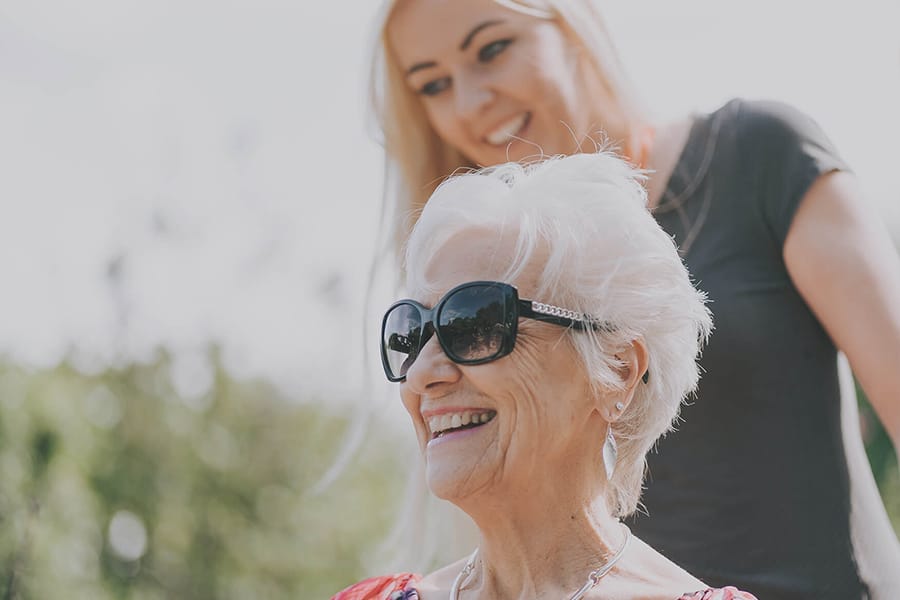Did you know that people aged 65 years and older are at increased risk of heat-related illness in hot weather conditions? And even if you’re younger, taking care when the mercury rises to above 30°C is vital to avoid the serious implications of heat stress.
At Unique Senior Care, we want to make sure you and your loved ones are able to make the most of this unexpected heatwave while staying safe in the sun, so we’ve compiled a list of our five top tips to keep cool…
Know the symptoms of heat stress
It’s important to know what to look out for in yourself and others, so make a note of the main symptoms of heat stress and perform regular checks on yourself and others when the weather heats up.
Being overheated for too long or being exposed without protection to the sun can cause many health problems. Heat-related illnesses include the following:
Heat syncope is a sudden dizziness that can happen when you are active in hot weather. If you take a heart medication called a beta blocker or are not acclimated to hot weather, you are even more likely to feel faint. Rest in a cool place, put your legs up, and drink water to make the dizzy feeling go away.
Heat cramps are the painful tightening or spasms of muscles in your stomach, arms, or legs. Cramps can result from hard work or intense exercise.
Though your body temperature and pulse usually stay normal during heat cramps, your skin may feel moist and cool. Stop the physical activity you’re doing and rest in the shade or in a cool building. Drink plenty of fluids, such as water and sports drinks containing electrolytes. Do not consume alcohol or caffeinated beverages.
Heat oedema is a swelling in your ankles and feet when you get hot. Encourage clients to put their legs up to help reduce swelling.
Heat rash is a skin irritation from heavy sweating. It causes red clusters of small blisters that look similar to pimples on the skin. The skin may feel itchy or people may feel a “prickly” tingling pain. Keep the infected area dry, and stay in cool areas.
Heat exhaustion is a warning that the body can no longer keep itself cool. People might feel thirsty, dizzy, weak, uncoordinated, and nauseated. You may sweat a lot. The body temperature may stay normal, but the skin may feel cold and clammy.
Some people with heat exhaustion have a rapid pulse. Encourage clients to rest in a cool place and get plenty of fluids. If they don’t feel better soon, get medical care. Be cautious because heat exhaustion can progress to heat stroke.
Heat stroke is a medical emergency in which the body’s temperature rises above 104°F. Signs of heat stroke are fainting; confusion or acting strangely; not sweating even when it’s hot; dry, flushed skin; strong, rapid pulse; or a slow, weak pulse.
When a person has any of these symptoms, they should seek medical help right away and immediately move to a cooler place, such as under shade or indoors. They should also take action to lower their body temperature with cool clothes, a cool bath or shower, and fans.
Sun exposure, also known as sunburn, is a sign of skin damage due to extreme or long exposure. Your skin may appear red and tender, develop blisters, start to peel, and be warm to the touch. Severe reactions may cause fever, chills, nausea, or rash.
Prevent sunburn by wearing protective clothing that covers your skin and staying out of direct sunlight. Using a broad-spectrum sunscreen with an SPF of 15 or higher can also help prevent sunburns, but be sure to reapply often. If you are sunburned, wear lightweight clothing, take cool showers, moisturise affected areas, and stay out of the sun so the skin can heal.
Here’s some additional advice from Age UK
Be prepared for hot weather
If the weather forecast says it will be hot, prepare for it! It’s much better to be over prepared than under, and no one wants to rush to the shops to find the last fan has been sold – keep all the essentials ready so you can enjoy the hot weather without becoming flustered.
Avoid the hottest hours
The hottest hours of the day are between 11am and 3pm, so avoid going out or doing too much activity during those times. You could even try a European siesta in the afternoon!
Don’t forget your hat
Even if you’re applying sun cream regularly while outside, you’re still at risk of sun damage to your scalp if you’re not wearing a hat. Try a broad-brimmed one to provide further protection on your face, and don’t forget the sunglasses either!
Bring a bottle
Of water, of course! Drinking plenty is key to staying healthy, especially in hot weather when you’re losing more fluids than normal through sweat. And if you’re travelling anywhere, make sure you always have a bottle of water handy.
There’s no reason everyone can’t enjoy the rare sunshine when it makes an appearance – just make sure you stay safe and look after anyone who’s more vulnerable to heat-related illness, and we’ll all have a summer to remember!
It’s also as important to look out for elderly people in the colder weather. Read more.



